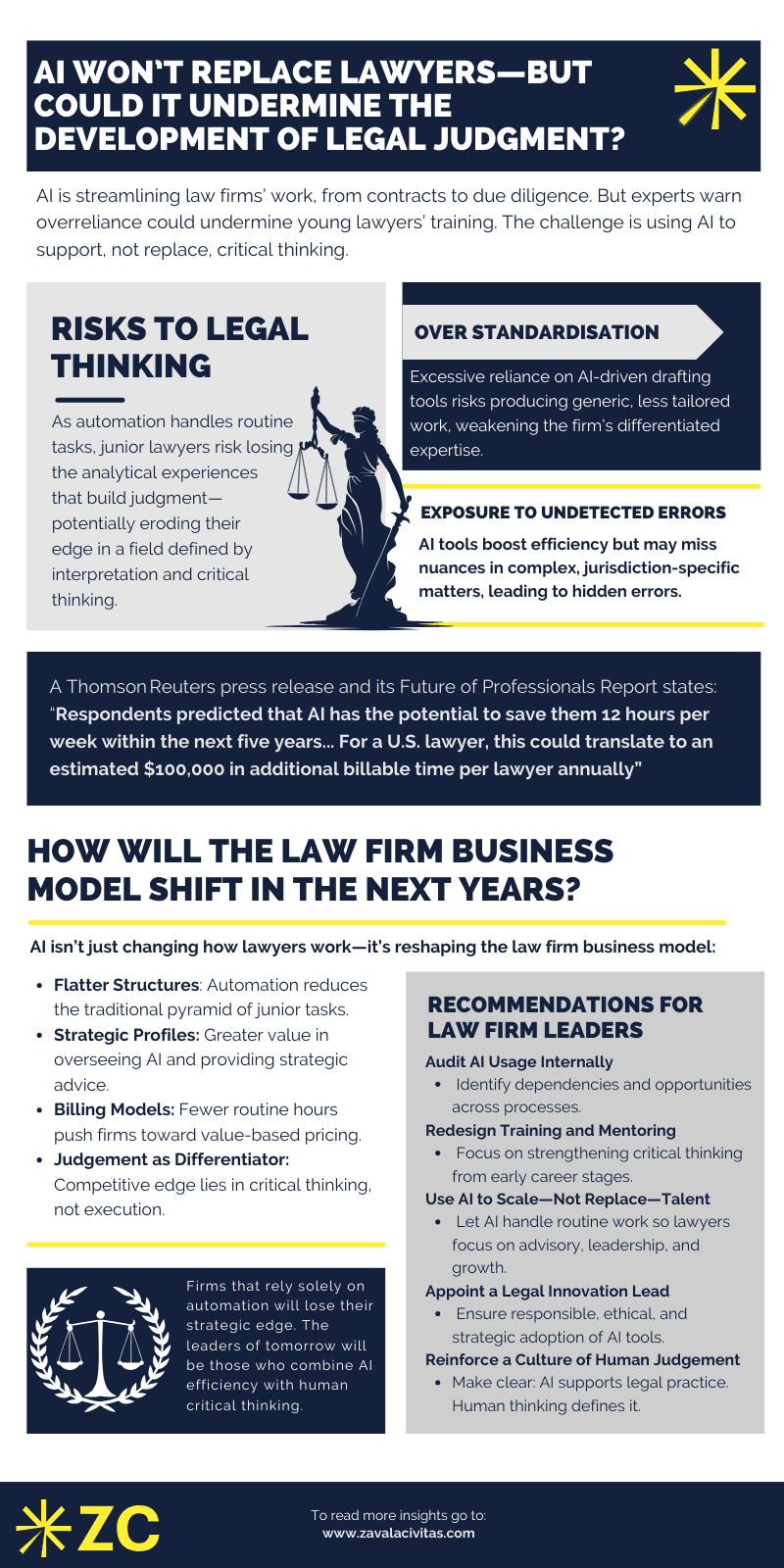AI is no longer a distant prospect. Automated contracts, due diligence completed in minutes, and AI-generated reports are now embedded in the daily operations of many law firms. Yet, as José María Alonso highlighted in a recent interview with us, this transformation presents a double-edged sword:
“AI is becoming crucial for processing large volumes of information, such as 1,000-page briefs and thousands of documents. This multiplies productivity but presents a challenge for training young lawyers, who may rely too heavily on these tools without developing the critical skills to analyse complex documents independently. It’s a difficult balance.”
The challenge, then, isn’t adopting AI—it’s using it without losing what makes a lawyer valuable: critical thinking and judgment. In this article, we look at how AI is impacting the legal sector, the risks it poses to training and judgement, and how firms can make practical use of it without compromising their core expertise.
1. Risks to Legal Thinking, Quality, and Talent Development
Critical thinking: As routine tasks become automated, there’s a growing concern within the sector that junior lawyers are gaining less exposure to the complex, analytical work traditionally needed to build professional judgement. In a profession defined by judgement and interpretation, losing critical thinking means losing your competitive advantage.
Over standardisation of Legal Advice
Excessive reliance on AI-driven drafting tools risks producing generic, less tailored work, weakening the firm’s differentiated expertise.
Increased Exposure to Undetected Errors
AI tools, while efficient, can overlook nuances or misinterpret data—especially in complex, jurisdiction-specific matters—leading to undetected mistakes.
AI should remain a tool, not a replacement for reasoning. Protecting the differentiating value of your firm should be a priority.
2. Where AI Is Delivering Tangible Benefits
Used strategically, AI delivers clear, measurable results:
- Document Review (Due Diligence)
Tools like Luminance and Kira Systems analyse contracts and documents, identifying key risks.
- Advanced Legal Research
Platforms like Westlaw Precision and Lexis+ AI speed up jurisprudence searches.
- Drafting Contracts and Reports
With Harvey AI, firms generate first drafts of contracts, reports, and summaries.
A Thomson Reuters press release and its Future of Professionals Report clearly states:
“Respondents predicted that AI has the potential to save them 12 hours per week within the next five years… For a U.S. lawyer, this could translate to an estimated $100,000 in additional billable time per lawyer annually”
3. How will the Business Model Shift in the next years?
AI isn’t just changing how lawyers work—it’s reshaping the law firm business model:
- Flatter Structures
Automating junior tasks erodes traditional pyramidal structures.
- Growing Importance of Strategic Profiles
Supervising AI and delivering strategic advice are becoming more valuable.
- From Billable Hours to Value-Based Billing
Less time spent on routine tasks means firms must rethink pricing models and value propositions.
- Differentiation Through Judgement, Not Execution
AI commoditises delivery. The true competitive edge will lie in human thinking and strategic insight.
Tomorrow’s law firms won’t need technologists. They’ll need hybrid legal leaders.
4. Strategic Recommendations for Law Firm Leaders
- Audit AI Usage Internally
Identify dependencies and opportunities across processes.
- Redesign Training and Mentoring
Focus on strengthening critical thinking from early career stages.
- Use AI to Scale—Not Replace—Talent
Let AI handle routine work so lawyers focus on advisory, leadership, and growth.
- Appoint a Legal Innovation Lead
Ensure responsible, ethical, and strategic adoption of AI tools.
- Reinforce a Culture of Human Judgement
Make clear: AI supports legal practice. Human thinking defines it.
Conclusion: AI Won’t Replace Lawyers—But It Could Replace Law Firms
Technology adoption is inevitable. But firms that rely solely on automation will lose their strategic edge. The leaders of tomorrow will be those who combine AI efficiency with human critical thinking.
To get in contact with our team click here.










